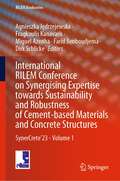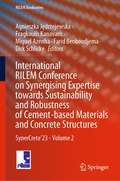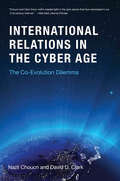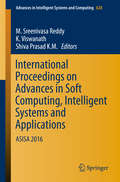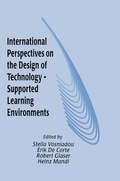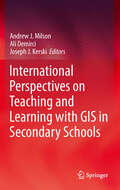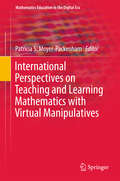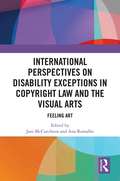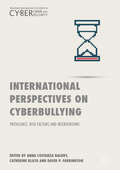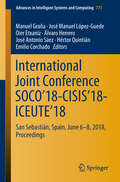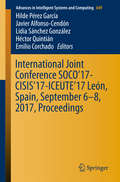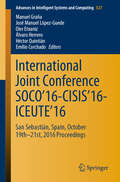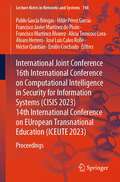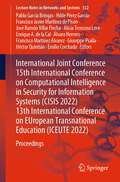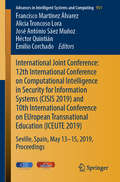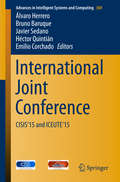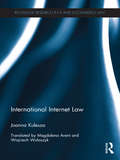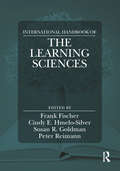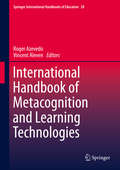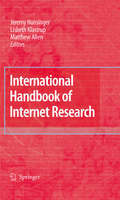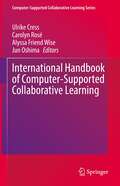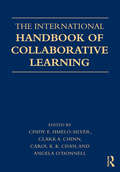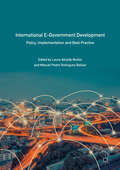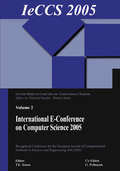- Table View
- List View
International RILEM Conference on Synergising Expertise towards Sustainability and Robustness of Cement-based Materials and Concrete Structures: SynerCrete’23 - Volume 1 (RILEM Bookseries #43)
by Agnieszka Jędrzejewska Fragkoulis Kanavaris Miguel Azenha Farid Benboudjema Dirk SchlickeThis book highlights the latest advances, innovations, and applications in cement-based materials (CBM) and concrete structures, as presented by leading international researchers and engineers at the International RILEM Conference on synergizing expertise toward sustainability and robustness of CBM and concrete structures (SynerCrete), held in Milos Island, Greece, on June 14-16, 2023. The aim of the conference was to discuss and arouse progress in research, development, and application of CBM and structural concrete through combination of expertise from distinct fields of knowledge, such as performance-based design, 3D modeling for analysis/design, building information modeling, and even robotics, while keeping focus on multiscale approaches at time and spatial levels. It covers a diverse range of topics concerning alternative concrete formulations for adaptation to climate change, performance-based and multiphysics/multiscale design and innovative testing, structural health monitoring and maintenance management, integral BIM-based planning, and resource-responsible building. The contributions, which were selected by means of a rigorous international peer-review process, present a wealth of exciting ideas that will open novel research directions and foster new multidisciplinary collaborations. The two volumes encompass more than 200 original contributions in the field.
International RILEM Conference on Synergising Expertise towards Sustainability and Robustness of Cement-based Materials and Concrete Structures: SynerCrete’23 - Volume 2 (RILEM Bookseries #44)
by Agnieszka Jędrzejewska Fragkoulis Kanavaris Miguel Azenha Farid Benboudjema Dirk SchlickeThis book highlights the latest advances, innovations, and applications in cement-based materials (CBM) and concrete structures, as presented by leading international researchers and engineers at the International RILEM Conference on synergizing expertise toward sustainability and robustness of CBM and concrete structures (SynerCrete), held in Milos Island, Greece, on June 14-16, 2023. The aim of the conference was to discuss and arouse progress in research, development, and application of CBM and structural concrete through combination of expertise from distinct fields of knowledge, such as performance-based design, 3D modeling for analysis/design, building information modeling, and even robotics, while keeping focus on multiscale approaches at time and spatial levels. It covers a diverse range of topics concerning alternative concrete formulations for adaptation to climate change, performance-based and multiphysics/multiscale design and innovative testing, structural health monitoring and maintenance management, integral BIM-based planning, and resource-responsible building. The contributions, which were selected by means of a rigorous international peer-review process, present a wealth of exciting ideas that will open novel research directions and foster new multidisciplinary collaborations. The two volumes encompass more than 200 original contributions in the field.
International Relations in the Cyber Age: The Co-Evolution Dilemma (The\mit Press Ser.)
by Nazli Choucri David D. ClarkA foundational analysis of the co-evolution of the internet and international relations, examining resultant challenges for individuals, organizations, firms, and states.In our increasingly digital world, data flows define the international landscape as much as the flow of materials and people. How is cyberspace shaping international relations, and how are international relations shaping cyberspace? In this book, Nazli Choucri and David D. Clark offer a foundational analysis of the co-evolution of cyberspace (with the internet as its core) and international relations, examining resultant challenges for individuals, organizations, and states.The authors examine the pervasiveness of power and politics in the digital realm, finding that the internet is evolving much faster than the tools for regulating it. This creates a “co-evolution dilemma”—a new reality in which digital interactions have enabled weaker actors to influence or threaten stronger actors, including the traditional state powers. Choucri and Clark develop a new method for addressing control in the internet age, “control point analysis,” and apply it to a variety of situations, including major actors in the international and digital realms: the United States, China, and Google. In doing so they lay the groundwork for a new international relations theory that reflects the reality in which we live—one in which the international and digital realms are inextricably linked and evolving together.
International Proceedings on Advances in Soft Computing, Intelligent Systems and Applications
by M. Sreenivasa Reddy K. Viswanath Shiva Prasad K.M.The book focuses on the state-of-the-art technologies pertaining to advances in soft computing, intelligent system and applications. The Proceedings of ASISA 2016 presents novel and original work in soft computing, intelligent system and applications by the experts and budding researchers. These are the cutting edge technologies that have immense application in various fields. The papers discuss many real world complex problems that cannot be easily handled with traditional mathematical methods. The exact solution of the problems at hand can be achieved with soft computing techniques. Soft computing represents a collection of computational techniques inheriting inspiration from evolutionary algorithms, nature inspired algorithms, bio-inspired algorithms, neural networks and fuzzy logic.
International Perspectives on the Design of Technology-supported Learning Environments
by Robert Glaser Stella Vosniadou Erik De Corte Heinz MandlIn recent years, the use of technology for the purposes of improving and enriching traditional instructional practices has received a great deal of attention. However, few works have explicitly examined cognitive, psychological, and educational principles on which technology-supported learning environments are based. This volume attempts to cover the need for a thorough theoretical analysis and discussion of the principles of system design that underlie the construction of technology-enhanced learning environments. It presents examples of technology-supported learning environments that cover a broad range of content domains, from the physical sciences and mathematics to the teaching of language and literacy. The emphasis in this book is not on the design of educational software but on the design of learning environments. A great deal of research on learning and instruction has recently moved out of the laboratory into the design of applications in instructional settings. By designing technology-supported learning environments instructional scientists attempt to better understand the theories and principles that are explicit in their theories of learning. The contributors to this volume examine how factors such as social interaction, the creation of meaningful activities, the use of multiple perspectives, and the construction of concrete representations influence the acquisition of new information and transfer.
International Perspectives on Teaching and Learning with GIS in Secondary Schools
by Joseph J. Kerski Andrew J. Milson Ali DemirciThis, the first publication to collate a broad international perspective on the pedagogical value of GIS technology in classrooms, offers an unprecedented range of expert views on the subject. Geographic Information Systems (GISs) are now ubiquitous and relatively inexpensive. They have revolutionized the way people explore and understand the world around them. The capability they confer allows us to capture, manage, analyze, and display geographic data in ways that were undreamt of a generation ago. GIS has enabled users to make decisions and solve problems as diverse as designing bus routes, locating new businesses, responding to emergencies, and researching climate change. GIS is also having a major impact in the classroom. Students and teachers around the world are using this significant emerging technology in the secondary school classroom to study social and scientific concepts and processes, to broaden their technical skills, and to engage in problem solving and decision making about local and global issues. International Perspectives on Teaching and Learning with GIS in Secondary Schools brings together authors from 34 countries who profile the current status of GIS in secondary school teaching and learning in their country. Each chapter includes a summary of the country's educational context, a case study illustrating how GIS is used in secondary schooling, and an assessment of the opportunities and challenges in teaching and learning with GIS now and in the future. The book demonstrates that GIS is not only a technological tool to be used in the classroom, but also a catalyst for motivation, encouragement, and cooperation in understanding and solving global problems. The most up to date and extensive survey of GIS in the secondary education landscape, covering both principles and practice. Professor David Maguire, Pro-Vice-Chancellor, Birmingham City University, UK International Perspectives on Teaching and Learning With GIS in Secondary Schools is a highly relevant, critically important, reflective contribution to the literature, providing strong arguments supporting the inclusion for spatial studies for all in secondary school education. Karl Donert, President, EUROGEO This is an invaluable and inspirational examination of innovation in geospatial technologies in secondary schools around the world. Each chapter contains practical models for how to integrate powerful tools for spatial analysis into a range of subjects. It will be useful to classroom teachers and administrators seeking pathways to implementation and teacher educators considering how to prepare the next generation to use geospatial technologies. Sarah Witham Bednarz, Department of Geography, Texas A&M University, College Station, TX, USA
International Perspectives on Teaching and Learning Mathematics with Virtual Manipulatives
by Patricia S. Moyer-PackenhamThis book explores terminology, frameworks, and research being conducted worldwide on virtual manipulatives. It brings together international authors who provide their perspectives on virtual manipulatives in research and teaching. By defining terminology, explaining conceptual and theoretical frameworks, and reporting research, the authors provide a comprehensive foundation on the study and use of virtual manipulatives for mathematics teaching and learning. This foundation provides a common way for researchers to communicate about virtual manipulatives and build on the major works that have been conducted on this topic. By discussing these big ideas, the book advances knowledge for future research on virtual manipulatives as these dynamic tools move from computer platforms to hand-held, touch-screen, and augmented platforms.
International Perspectives on Disability Exceptions in Copyright Law and the Visual Arts: Feeling Art
by Jani McCutcheon and Ana RamalhoThis book provides an overview of disability exceptions to copyright infringement and the international and human rights legal framework for disability rights and exceptions. The focus is on those exceptions as they apply to visual art, while the book presents a comprehensive study of copyright’s disability exceptions per se and the international and human rights law framework in which they are situated. 3D printing now allows people with a visual impairment to experience 3D reproductions of paintings, drawings and photographs through touch. At the same time, the uncertain application of existing disability exceptions to these reproductions may generate concerns about legal risk, hampering sensory art projects and reducing inclusivity and equity in cultural engagement by people with a visual impairment. The work adopts an interdisciplinary approach, with contributions from diverse stakeholders, including persons with disabilities, cultural institutions and the 3D printing industry. The book sketches the scene relating to sensory art projects. Experts in intellectual property, human rights, disability and art law then critically analyse the current legal landscape relating to disability access to works of visual art at both international and regional levels, as well as across a broad representative sample of national jurisdictions, and identify where legal reform is required. This comparative analysis of the laws aims to better inform stakeholders of the applicable legal landscape, the legal risks and opportunities associated with sensory art and the opportunities for reform and best practice guidelines, with the overarching goal of facilitating international harmonisation of the law and enhanced inclusivity.
International Perspectives on Cyberbullying: Prevalence, Risk Factors And Interventions (Palgrave Studies In Cybercrime And Cybersecurity Ser.)
by David P. Farrington Catherine Blaya Anna Costanza BaldryThis book brings together an international group of experts to present the latest psychosocial and developmental criminological research on cyberbullying, cybervictimization and intervention. With contributions from a wide range of European countries, including Cyprus, Greece, Ireland, Italy, France, Hungary, Spain, and the United Kingdom, as well as from Canada and the USA, this authoritative volume explores the nature, risk factors, and prevalence of cyberbullying among children and adolescents. A particularly original focus is directed towards the Tabby project (Threat Assessment of online Bullying Behaviour among Youngsters), an intervention programme based on the threat and risk assessment approach which seeks to prevent the occurrence of violence and its recidivism.Presenting cutting-edge research on developmental criminology and legal psychology, International Perspectives on Cyberbullying is a comprehensive resource for practitioners, teachers, parents, and researchers, as well as scholars of criminology, psychology, and education.
International Joint Conference SOCO’18-CISIS’18-ICEUTE’18: San Sebastián, Spain, June 6-8, 2018 Proceedings (Advances in Intelligent Systems and Computing #771)
by Manuel Graña José Manuel López-Guede Oier Etxaniz Álvaro Herrero José Antonio Sáez Héctor Quintián Emilio CorchadoThis book includes papers presented at SOCO 2018, CISIS 2018 and ICEUTE 2018, all held in the beautiful and historic city of San Sebastian (Spain), in June 2018. Soft computing represents a collection or set of computational techniques in machine learning, computer science and some engineering disciplines, which investigate, simulate, and analyze highly complex issues and phenomena. After a rigorous peer-review process, the 13th SOCO 2018 International Program Committee selected 41 papers, with a special emphasis on optimization, modeling and control using soft computing techniques and soft computing applications in the field of industrial and environmental enterprises. The aim of the 11th CISIS 2018 conference was to offer a meeting opportunity for academic and industry researchers from the vast areas of computational intelligence, information security, and data mining. The need for intelligent, flexible behaviour by large, complex systems, especially in mission-critical domains, was the catalyst for the overall event.Eight of the papers included in the book were selected by the CISIS 2018 International Program Committee. The International Program Committee of ICEUTE 2018 selected 11 papers for inclusion in these conference proceedings.
International Joint Conference SOCO’17-CISIS’17-ICEUTE’17 León, Spain, September 6–8, 2017, Proceeding
by Hilde Pérez García Javier Alfonso-Cendón Lidia Sánchez González Héctor Quintián Emilio CorchadoThis volume includes papers presented at SOCO 2017, CISIS 2017, and ICEUTE 2017, all conferences held in the beautiful and historic city of León (Spain) in September 2017.Soft computing represents a collection of computational techniques in machine learning, computer science, and some engineering disciplines, which investigate, simulate, and analyze highly complex issues and phenomena.These proceedings feature 48 papers from the 12th SOCO 2017, covering topics such as artificial intelligence and machine learning applied to health sciences; and soft computing methods in manufacturing and management systems.The book also presents 18 papers from the 10th CISIS 2017, which provided a platform for researchers from the fields of computational intelligence, information security, and data mining to meet and discuss the need for intelligent, flexible behavior by large, complex systems, especially in mission-critical domains. It addresses various topics, like identification, simulation and prevention of security and privacy threats in modern communication networks Furthermore, the book includes 8 papers from the 8th ICEUTE 2017. The selection of papers for all three conferences was extremely rigorous in order to maintain the high quality and we would like to thank the members of the Program Committees for their hard work in the reviewing process.
International Joint Conference SOCO’16-CISIS’16-ICEUTE’16
by Manuel Graña José Manuel López-Guede Oier Etxaniz Álvaro Herrero Héctor Quintián Emilio CorchadoThis volume of Advances in Intelligent and Soft Computing contains accepted papers presented at SOCO 2016, CISIS 2016 and ICEUTE 2016, all conferences held in the beautiful and historic city of San Sebasti#65533;n (Spain), in October 2016. Soft computing represents a collection or set of computational techniques in machine learning, computer science and some engineering disciplines, which investigate, simulate, and analyze very complex issues and phenomena. After a through peer-review process, the 11th SOCO 2016 International Program Committee selected 45 papers. In this relevant edition a special emphasis was put on the organization of special sessions. Two special session was organized related to relevant topics as: Optimization, Modeling and Control Systems by Soft Computing and Soft Computing Methods in Manufacturing and Management Systems. The aim of the 9th CISIS 2016 conference is to offer a meeting opportunity for academic and industry-related researchers belonging to the various, vast communities of Computational Intelligence, Information Security, and Data Mining. The need for intelligent, flexible behaviour by large, complex systems, especially in mission-critical domains, is intended to be the catalyst and the aggregation stimulus for the overall event. After a through peer-review process, the CISIS 2016 International Program Committee selected 20 papers. In the case of 7th ICEUTE 2016, the International Program Committee selected 14 papers.
International Joint Conference SOCO’16-CISIS’16-ICEUTE’16: San Sebastián, Spain, October 19th-21st, 2016 Proceedings (Advances in Intelligent Systems and Computing #527)
by Manuel Graña José Manuel López-Guede Oier Etxaniz Álvaro Herrero Héctor Quintián Emilio CorchadoThis volume of Advances in Intelligent and Soft Computing contains accepted papers presented at SOCO 2016, CISIS 2016 and ICEUTE 2016, all conferences held in the beautiful and historic city of San Sebastián (Spain), in October 2016.Soft computing represents a collection or set of computational techniques in machine learning, computer science and some engineering disciplines, which investigate, simulate, and analyze very complex issues and phenomena.After a through peer-review process, the 11th SOCO 2016 International Program Committee selected 45 papers. In this relevant edition a special emphasis was put on the organization of special sessions. Two special session was organized related to relevant topics as: Optimization, Modeling and Control Systems by Soft Computing and Soft Computing Methods in Manufacturing and Management Systems.The aim of the 9th CISIS 2016 conference is to offer a meeting opportunity for academic and industry-related researchers belonging to the various, vast communities of Computational Intelligence, Information Security, and Data Mining. The need for intelligent, flexible behaviour by large, complex systems, especially in mission-critical domains, is intended to be the catalyst and the aggregation stimulus for the overall event.After a through peer-review process, the CISIS 2016 International Program Committee selected 20 papers. In the case of 7th ICEUTE 2016, the International Program Committee selected 14 papers.
International Joint Conference 16th International Conference on Computational Intelligence in Security for Information Systems: Proceedings (Lecture Notes in Networks and Systems #748)
by Pablo García Bringas Hilde Pérez García Francisco Javier Martínez de Pisón Francisco Martínez Álvarez Alicia Troncoso Lora Álvaro Herrero José Luis Calvo Rolle Héctor Quintián Emilio CorchadoThis book of Lecture Notes in Networks and Systems contains accepted papers presented at the 16th International Conference on Computational Intelligence in Security for Information Systems (CISIS 2023) and the 14th International Conference on EUropean Transnational Education (ICEUTE 2023). These conferences were held in the beautiful city of Salamanca, Spain, in September 2023.The aim of the CISIS 2023 conference is to offer a meeting opportunity for academic and industry-related researchers belonging to the various, vast communities of computational intelligence, information security, and data mining. The need for intelligent, flexible behavior by large, complex systems, especially in mission-critical domains, is intended to be the catalyst and the aggregation stimulus for the overall event. The aim of ICEUTE 2023 conference is to offer a meeting point for people working on transnational education within Europe. It provides a stimulating and fruitful forum for presenting and discussing the latest works and advances on transnational education within European countries.
International Joint Conference 15th International Conference on Computational Intelligence in Security for Information Systems: Proceedings (Lecture Notes in Networks and Systems #532)
by Pablo García Bringas Hilde Pérez García Francisco Javier Martínez de Pisón José Ramón Villar Flecha Alicia Troncoso Lora Enrique A. de la Cal Álvaro Herrero Francisco Martínez Álvarez Giuseppe Psaila Héctor Quintián Emilio CorchadoThis book of Lecture Notes in Networks and Systems contains accepted papers presented at the 15th International Conference on Computational Intelligence in Security for Information Systems (CISIS 2022) and the 13th International Conference on EUropean Transnational Education (ICEUTE 2022). These conferences were held in the beautiful city of Salamanca, Spain, in September 2022. The aim of the CISIS 2022 conference is to offer a meeting opportunity for academic and industry-related researchers belonging to the various, vast communities of computational intelligence, information security, and data mining. The need for intelligent, flexible behaviour by large, complex systems, especially in mission-critical domains, is intended to be the catalyst and the aggregation stimulus for the overall event. After a thorough peer review process, the CISIS 2022 International Program Committee selected 20 papers, which are published in this conference proceedings. In this edition, three special sessions were organized: Cybersecurity in Future Connected Societies, Cybersecurity and Trusted Supply Chains of ICT, and Intelligent Solutions for Cybersecurity Systems. The aim of ICEUTE 2022 is to offer a meeting point for people working on transnational education within Europe. It provides a stimulating and fruitful forum for presenting and discussing the latest works and advances on transnational education within European countries. In the case of ICEUTE 2022, the International Program Committee selected 5 papers, which are also published in this conference proceedings. The selection of papers was extremely rigorous to maintain the high quality of the conferences. We want to thank the members of the Program Committees for their hard work during the reviewing process. This is a crucial process for creating a high-standard conference; the CISIS and ICEUTE would not exist without their help.
International Joint Conference: Seville, Spain, May 13th-15th, 2019 Proceedings (Advances in Intelligent Systems and Computing #951)
by Francisco Martínez Álvarez Alicia Troncoso Lora José António Sáez Muñoz Héctor Quintián Emilio CorchadoThis volume presents papers presented at CISIS 2019 and ICEUTE 2019, held in the beautiful and historic city of Seville (Spain) in May 2019.The 12th CISIS 2019 conference offered a meeting opportunity for academic and industry-related researchers form the various communities of computational intelligence, information security and data mining, and the need for intelligent, flexible behaviour by large, complex systems, especially in mission-critical domains, was the catalyst and the aggregation stimulus for the event. The book covers current topics such as cryptographic and data analytics solutions to fulfil least minimum privilege and endorse least minimum effort in information systems. The book also includes 15 papers from the 10th ICEUTE 2019, covering topics like new approaches to assess competencies and innovation in computer science education.
International Joint Conference
by Álvaro Herrero Bruno Baruque Javier Sedano Héctor Quintián Emilio CorchadoThis volume of Advances in Intelligent and Soft Computing contains accepted papers presented at the 8th International Conference on Computational Intelligence in Security for Information Systems (CISIS 2015) and the 6th International Conference on European Transnational Education (ICEUTE 2015). These conferences were held in the beautiful and historic city of Burgos (Spain), in June 2015. The aim of the 8th CISIS conference is to offer a meeting opportunity for academic and industry-related researchers belonging to the various, vast communities of Computational Intelligence, Information Security, and Data Mining. The need for intelligent, flexible behaviour by large, complex systems, especially in mission-critical domains, is intended to be the catalyst and the aggregation stimulus for the overall event. After a through peer-review process, the CISIS 2015 International Program Committee selected 43 papers, written by authors from 16 different countries. In the case of 6th ICEUTE conference, the International Program Committee selected 12 papers (from 7 countries). These papers are published in present conference proceedings, achieving an acceptance rate of about 39%. The selection of papers was extremely rigorous in order to maintain the high quality of the conference and we would like to thank the members of the Program Committees for their hard work in the reviewing process. This is a crucial process to the creation of a high standard conference and the CISIS and ICEUTE conferences would not exist without their help.
International Internet Law (Routledge Research in Information Technology and E-Commerce Law)
by Joanna KuleszaThis book discusses the international legal issues underlying Internet Governance and proposes an international solution to its problems. The book encompasses a wide spectrum of current debate surrounding the governance of the internet and focuses on the areas and issues which urgently require attention from the international community in order to sustain the proper functioning of the global network that forms the foundation of our information fuelled society. Among the topics discussed are international copyright protection, state responsibility for cyber-attacks (cyberterrorism), and international on-line privacy protection. Taking a comparative approach by examining how different jurisdictions such as the United States, the European Union, China and Singapore have attempted various solutions to the problem of Internet Governance, the author offers a practical solution to the problem and is a proponent of International Internet Law. Kulesza suggests that just as in the case of International Environmental Law, an Internet Framework Convention could shape the starting point for international cooperation and lead to a clear, contractual division of state jurisdictional competences. International Internet Law is of particular interest to legal scholars engaged with the current challenges in international law and international relations, as well as students of law, international relations and political science. The issues discussed in the book are also relevant to journalists and other media professionals, facing the challenges of analyzing current international developments in cyberspace.
International Handbook of the Learning Sciences
by Frank Fischer Cindy E. Hmelo-Silver Susan R. Goldman Peter ReimannThe International Handbook of the Learning Sciences is a comprehensive collection of international perspectives on this interdisciplinary field. In more than 50 chapters, leading experts synthesize past, current, and emerging theoretical and empirical directions for learning sciences research. The three sections of the handbook capture, respectively: foundational contributions from multiple disciplines and the ways in which the learning sciences has fashioned these into its own brand of use-oriented theory, design, and evidence; learning sciences approaches to designing, researching, and evaluating learning broadly construed; and the methodological diversity of learning sciences research, assessment, and analytic approaches. This pioneering collection is the definitive volume of international learning sciences scholarship and an essential text for scholars in this area.
International Handbook of Metacognition and Learning Technologies
by Vincent Aleven Roger AzevedoIntegrating all aspects of the fields of metacognition and learning technologies, this book describes features of the learning technologies and how they have been designed to study and support metacognitive processing and self-regulated learning.
International Handbook of Internet Research
by Lisbeth Klastrup Matthew Allen Jeremy HunsingerThis handbook, the first of its kind, is a detailed introduction to the numerous academic perspectives we can apply to the study of the internet as a political, social and communicative phenomenon. Covering both practical and theoretical angles, established researchers from around the world discuss everything: the foundations of internet research appear alongside chapters on understanding and analyzing current examples of online activities and artifacts. The material covers all continents and explores in depth subjects such as networked gaming, economics and the law. The sheer scope and breadth of topics examined in this volume, which ranges from on-line communities to e-science via digital aesthetics, are evidence that in today's world, internet research is a vibrant and mature field in which practitioners have long since stopped considering the internet as either an utopian or dystopian "new" space, but instead approach it as a medium that has become an integral part of our everyday culture and a natural mode of communication.
International Handbook of Computer-Supported Collaborative Learning (Computer-Supported Collaborative Learning Series #19)
by Ulrike Cress Alyssa Friend Wise Carolyn Rosé Jun OshimaCSCL has in the past 15 years (and often in conjunction with Springer) grown into a thriving and active community. Yet, lacking is a comprehensive CSCL handbook that displays the range of research being done in this area. This handbook will provide an overview of the diverse aspects of the field, allowing newcomers to develop a sense of the entirety of CSCL research and for existing community members to become more deeply aware of work outside their direct area. The handbook will also serve as a ready reference for foundational concepts, methods, and approaches in the field. The chapters are written in such a way that each of them can be used in a stand-alone fashion while also serving as introductory readings in relevant study courses or in teacher education. While some CSCL-relevant topics are addressed in the International Handbook of the Learning Sciences and the International Handbook of Collaborative Learning, these books do not aim to present an integrated and comprehensive view of CSCL. The International Handbook of Computer- Supported Collaborative Learning covers all relevant topics in CSCL, particularly recent developments in the field, such as the rise of computational approaches and learning analytics.
The International Handbook of Collaborative Learning (Educational Psychology Handbook)
by Cindy E. Hmelo-Silver Clark A. Chinn Carol K. K. Chan Angela M. O’DonnellCollaborative learning has become an increasingly important part of education, but the research supporting it is distributed across a wide variety of fields including social, cognitive, developmental, and educational psychology, instructional design, the learning sciences, educational technology, socio-cultural studies, and computer-supported collaborative learning. The goal of this book is to integrate theory and research across these diverse fields of study and, thereby, to forward our understanding of collaborative learning and its instructional applications. The book is structured into the following 4 sections: 1) Theoretical Foundations 2) Research Methodologies 3) Instructional Approaches and Issues and 4) Technology. Key features include the following: Comprehensive and Global – This is the first book to provide a comprehensive review of the widely scattered research on collaborative learning including the contributions of many international authors. Cross disciplinary – The field of collaborative learning is highly interdisciplinary drawing scholars from psychology, computer science, mathematics education, science education, and educational technology. Within psychology, the book brings together perspectives from cognitive, social, and developmental psychology as well as from the cross-disciplinary field of the learning sciences. Chapter Structure – To ensure consistency across the book, authors have organized their chapters around integrative themes and issues. Each chapter author summarizes the accumulated literature related to their chapter topic and identifies the strengths and weaknesses of the supporting evidence. Strong Methodology – Each chapter within the extensive methodology section describes a specific methodology, its underlying assumptions, and provide examples of its application. This book is appropriate for researchers and graduate level instructors in educational psychology, learning sciences, cognitive psychology, social psychology, computer science, educational technology, teacher education and the academic libraries serving them. It is also appropriate as a graduate level textbook in collaborative learning, computer-supported collaborative learning, cognition and instruction, educational technology, and learning sciences.
International E-Government Development
by Laura Alcaide Muñoz Manuel Pedro Rodríguez BolívarThis book provides an examination of e-Government frameworks and maturity stages in governments around the world, including an overview of the legal frameworks that have supported them. Divided into three sections, the first part of this book analyses the theoretical context of current policies, codes of best practice and their implementation. The second section presents case studies which bring key issues to the fore including open government, privacy protection, social media, democracy, systems failures, innovations in inter-organizational e-government projects, and open data systems. The authors demonstrate the importance of the successful implementation of e-Government for improving managerial efficiency, public service delivery and citizen engagement, with special attention given to developing countries. The book concludes by drawing out the lessons learned from the latest research and recommending solutions for improving the implementation of e-Government in the future, thereby helping to achieve more transparent, participative and democratic societies. This book will provide an invaluable resource for researchers, policy-makers, public managers, international organizations and technical experts.
International e-Conference on Computer Science (IeCCS 2005)
by Theodore SimosThe aim of IeCCS 2005, which was held in May 2005, was to bring together leading scientists of the international Computer Science community and to attract original research papers. This volume in the Lecture Series on Computer and Computational Sciences contains the extended abstracts of the presentations. The topics covered included (but were not limited to): Numerical Analysis, Scientific Computation, Computational Mathematics, Mathematical Software, Programming Techniques and Languages, Parallel Algorithms and its Applications, Symbolic and Algebraic Manipulation, Analysis of Algorithms, Problem Complexity, Mathematical Logic, Formal Languages, Data Structures, Data Bases, Information Systems, Artificial Intelligence, Expert Systems, Simulation and Modeling, Computer Graphics, Software Engineering, Image Processing, Computer Applications, Hardware, Computer Systems Organization, Software, Data, Theory of Computation, Mathematics of Computing, Information Systems, Computing Methodologies, Computer Applications and Computing Milieu.
